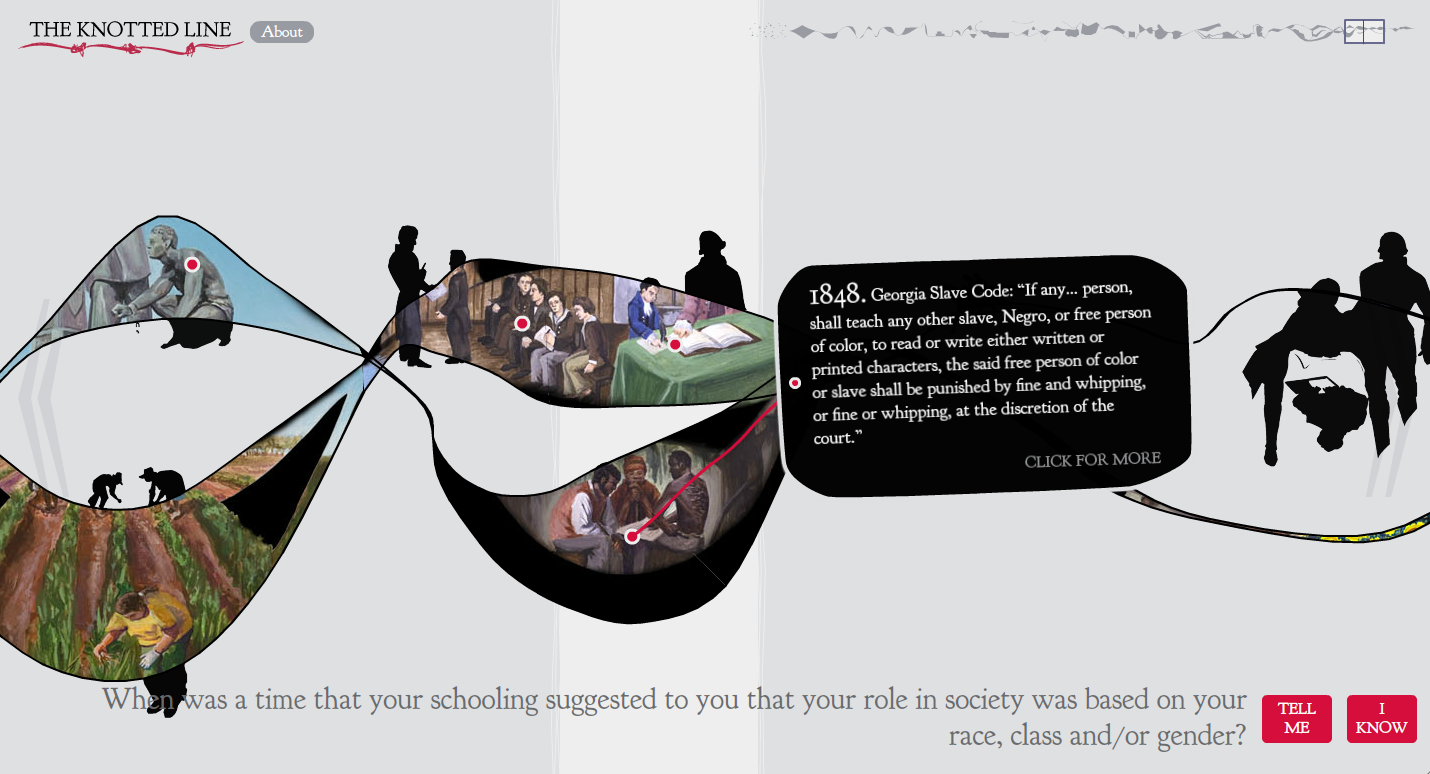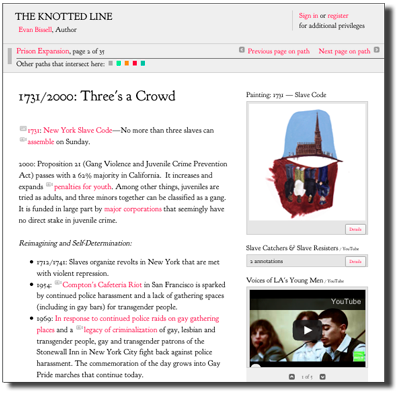 The Knotted Line is an interactive, tactile laboratory for exploring the historical relationship between freedom and confinement in the geographic area of the United States. With miniature paintings of over 50 historical moments from 1495-2025, The Knotted Line asks: how is freedom measured? Just as importantly, The Knotted Line imagines a new world through the work of grassroots movements for self-determination. Features teacher resources including realated media, lesson plans, and discussion questions that are adaptable for middle through college, and for community groups. [Website description.]
The Knotted Line is an interactive, tactile laboratory for exploring the historical relationship between freedom and confinement in the geographic area of the United States. With miniature paintings of over 50 historical moments from 1495-2025, The Knotted Line asks: how is freedom measured? Just as importantly, The Knotted Line imagines a new world through the work of grassroots movements for self-determination. Features teacher resources including realated media, lesson plans, and discussion questions that are adaptable for middle through college, and for community groups. [Website description.]
Page and content sample:

1731/2000: Three’s a Crowd
1731: New York Slave Code — No more than three slaves can assemble on Sunday.

2000: Proposition 21 (Gang Violence and Juvenile Crime Prevention Act) passes with a 62% majority in California. It increases and expands penalties for youth. Among other things, juveniles are tried as adults, and three minors together can be classified as a gang. It is funded in large part by major corporations that seemingly have no direct stake in juvenile crime.
Reimagining and Self-Determination:
- 1712/1741: Slaves organize revolts in New York that are met with violent repression.
- 1954: Compton’s Cafeteria Riot in San Francisco is sparked by continued police harassment and a lack of gathering spaces (including in gay bars) for transgender people.
- 1969: In response to continued police raids on gay gathering places and a legacy of criminalization of gay, lesbian and transgender people, gay and transgender patrons of the Stonewall Inn in New York City fight back against police harassment. The commemoration of the day grows into Gay Pride marches that continue today.
- Youth organizing around Prop 21 spreads across California, politicizing many youth and bringing the issue of youth imprisonment to the forefront.
Discussion Questions:
- Why would laws prevent slaves from gathering on Sundays specifically?
- How do laws against public gathering relate to education?
- Why would oil corporations support a youth crime bill?
- Not all pressures against public gathering come from laws. How do community norms prevent certain people from gathering in public?
- Consider the debate around gay marriage and the campaign against it. Why are public demonstrations of queer identity fought against so strongly?
Additional Resources:
|
 The Knotted Line is an interactive, tactile laboratory for exploring the historical relationship between freedom and confinement in the geographic area of the United States. With miniature paintings of over 50 historical moments from 1495-2025, The Knotted Line asks: how is freedom measured? Just as importantly, The Knotted Line imagines a new world through the work of grassroots movements for self-determination. Features teacher resources including realated media, lesson plans, and discussion questions that are adaptable for middle through college, and for community groups. [Website description.]
The Knotted Line is an interactive, tactile laboratory for exploring the historical relationship between freedom and confinement in the geographic area of the United States. With miniature paintings of over 50 historical moments from 1495-2025, The Knotted Line asks: how is freedom measured? Just as importantly, The Knotted Line imagines a new world through the work of grassroots movements for self-determination. Features teacher resources including realated media, lesson plans, and discussion questions that are adaptable for middle through college, and for community groups. [Website description.]









Twitter
Google plus
LinkedIn